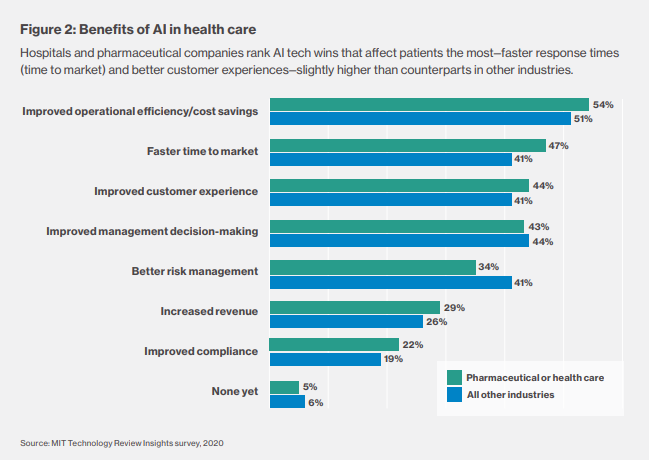Artificial intelligence is all the rage these days. In the recent MIT Technology Review Insights Survey, industry veterans agree, that artificial intelligence is poised to disrupt healthcare delivery.

Everyone is clamoring to be the next enviable company with artificial intelligence baked in. At the risk of sounding the same, this month, I wanted to highlight some very practical and real-world implementations of artificial intelligence in surgery scheduling and how we here at CaseCTRL are preparing for the future. Artificial intelligence and more importantly data insights are at the core of making the most seamless and efficient surgical scheduling platform. These innovations give our partners the leg up to stay ahead of their competition. Below we highlight 4 key areas in surgical care where artificial intelligence and data are making big impacts.
Save Surgeons Time with Efficient Surgery Scheduling
A surgeon performs hundreds of cases a year. Of these cases, on average we see that about 5% represent one-off surgeries. The remaining 95% represent variations of the same formula. Then why is it so burdensome for surgeons to schedule their surgeries? Does your institution have a mechanism to track every surgeon's most common procedures? Without measuring a process, it is impossible to understand the problems or identify areas for improvement. As we become saturated with data from our EMR platforms, it is important to have appliances in place to mine and interpret this data.
In our platform, Case Builder deliberately learns the nuances of each individual surgeon's cases making their common cases templatable and easily reproducible. In conjunction with the library of anonymized pooled data across our system, we can see commonalities and differences across practices for the same procedures. This position affords us the ability to deliver unparalleled insights about variances between specific cases, surgeons, and patients with the ultimate goal of empowering everyone in the surgical chain of command. Is your institution unlocking the secrets in your scheduling data?
Maximizing Reimbursement for Surgery
Accurate billing is essential for optimal billings and collections. Surgeons expend considerable time to code their cases. And when surgeons entrust this vital exercise to anyone else, the results are often disastrous with inadequate coding or worse, dismissed, denied bills. Coding is an exercise ripe for disruption with predictable and programmable guidelines. If your institution has not already invested here, this is easy low hanging fruit. Significant dollars can be recaptured with a robust coding program. See how our partners are already benefiting from CaseCTRL's sophisticated coding engines that deliver optimal coding to surgeons in real-time.
Predictive Patient Communications
With the experience of hundreds of patients under our belt at CaseCTRL, we can spot trends or deviations in surgical care instantaneously. Consequently, we can provide feedback to both patients and care providers at the precise moment trouble may be brewing. It gives care teams the opportunity to intervene and prevent costly complications. As our library of data grows, we learn from our partners' collective experience. Predictive text cues push reminders, encouragement, and more to patients on a timetable personalized to their surgery. We recommend implementing goalposts or checkpoints in patient care that can help track patients' progress in their continuum of surgical care. If available, leverage your EMR to automatically check-in with patients and flag those that might require more attention. This can decompress your staff workload but still proactively catch potential pitfalls.
Automation to Boost Scheduler Efficiency
One of the most illuminating observations for surgeons, when they start using CaseCTRL, is the amount of work schedulers expend to successfully schedule surgical candidates. On average a routine elective surgery can take as much as 4 hours cumulatively with over 20+ messages exchanged with vendors, facilities, therapists, patient, anesthesia, etc to successfully schedule. Without transparency, many are unaware of where bottlenecks and leaks exist in their pipeline. When mechanisms are introduced to track the progress of scheduling, accountability is unlocked. These mechanisms obliterate the historically insular surgical schedule silos, inviting collaboration and opportunities for synergy within practices. With a robust artificial intelligence engine, best practices for surgical scheduling can be illuminated and redundant administrative tasks can be relegated to the computer. With CaseCTRL we have boosted schedulers efficiency on average 400% by eliminating mundane clerical tasks our algorithms have identified and assumed responsibility for.
How can we help you?
We have only scratched the surface on what we can accomplish with a robust data-driven operation (no pun intended). If the future of accountable data-driven surgical scheduling is appealing to you, contact us now!






